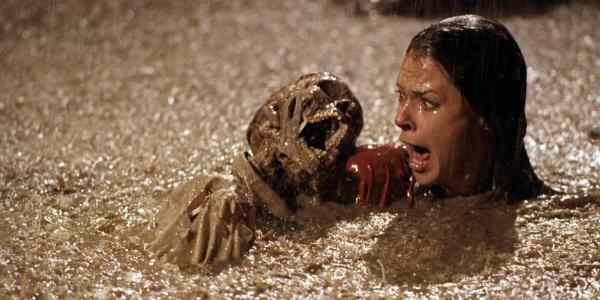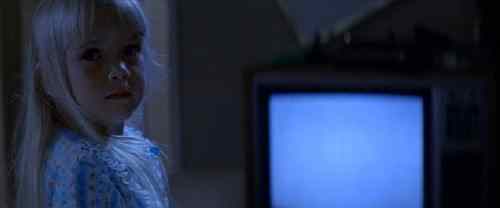Filmmakers in the 1980s had a serious obsession with the American dream. Part of it, I think, was due to the fetish-like obsession with ‘50s Americana. People wanted a very Norman Rockwell view of middle class America. That’s what was sold to us, and that’s what we got in our comedies, family features, and even our horror films. Reagan painted a picture of a very idealized version of the USA. Small towns, white picket fences. Most importantly: families.
Don’t get me wrong, family is important. But like almost everything on a large-scale cultural level in the ‘80s, this version of iconic, slice-of-life America was incredibly materialistic. Much of the horror output of the era commented on these themes. But these were all themes that Tobe Hooper and Steven Spielberg expertly tapped into and put their own spin on in Poltergeist.
Of course, over the years, there’s been some debate as to who actually directed Poltergeist. The late, great Tobe Hooper is credited as director, but many people don’t believe that to be entirely true. There has been a longstanding belief that Steven Spielberg came in at some undetermined point to take the reins. Regardless of who directed the bulk of the movie, Spielberg wrote the script.
And while there are some great set pieces and great direction, most of the true success of Poltergeist lies at the story level. Right from the get go, in one long tracking shot, we are introduced to the quintessential white, suburban American family. Here we have a happy husband and wife, three kids, a dog, and a nice house in a very traditional suburban neighborhood. This is Norman Rockwell-esque, picture perfect suburbia. We get as much of it as we can stand right out of the gate, hitting us all at once to the point that it almost induces nausea.


But it’s all about to be torn apart. That’s the beauty of Poltergeist. It didn’t present these ideas, these characters and settings for no reason. Poltergeist is not about the American Dream as it’s so often referred to, it’s about the total and utter destruction of that. Everything these people use to define themselves as upper middle class white folk tend to do, all of it is turned against them.
The big tree in the yard that’s typically such an iconic thing becomes an absolute monster. Watching it attempt to eat poor Robbie was is of the scariest things I’d ever seen as a child, probably second only to the clown doll that drags him under the bed. Come to think of it, even if Carol-Anne got sucked into limbo, Robbie probably had it worse in that movie.
Of course, much of the action is centered around the TV, which was, at the time, becoming an obvious figure of disconnect among families. Everyone would focus on the screen and not so much on each other. It was something for families to do together that didn’t really require much interaction. Poltergeist is one of a trifecta of “Kill your TV” horror features that all happened to come out around the same time, with the other two being Videodrome and Halloween III: Season of the Witch. Looking at the movie from this level, it almost comes across as a victory over TV and the place it occupies in the home. The first shot is an extreme close-up of the screen and the last shot is of a TV set being discarded, thrown outside the hotel room and left there.
All of their material possessions are lashing out against them, literally attacking them. Their picture perfect suburbia is being distorted, twisted around them and used against them by the spirits of the dead. Which is one of the most endearing things about Poltergeist. These occurrences aren’t happening for no reason. The Freelings aren’t suffering for the sake of suffering. No, they’re suffering because this super-sweet, no worries, picture perfect suburbia they live in is actually built on a series of lies. And the ghosts see it as little more than a cruel joke.
 There’s a lot that lurks under the surface of even the nicest small towns and suburban neighborhoods. Everyone has their secrets. But Poltergeist tackles larger issues on a wider scale, so that what we’re actually dealing with is a whole town that’s just an image of quaintness built literally on top of a lie. The revelation that this lovely new neighborhood was developed on top of a former cemetery is chilling in the context of the story, but also does a great job of showing that nothing is ever as picturesque as it seems.
There’s a lot that lurks under the surface of even the nicest small towns and suburban neighborhoods. Everyone has their secrets. But Poltergeist tackles larger issues on a wider scale, so that what we’re actually dealing with is a whole town that’s just an image of quaintness built literally on top of a lie. The revelation that this lovely new neighborhood was developed on top of a former cemetery is chilling in the context of the story, but also does a great job of showing that nothing is ever as picturesque as it seems.
I think because people talk so much about what happened after the fact with Poltergeist and all of the tragedies that followed, they tend not to talk about what a genuinely great film it is. It’s insane that I should even have to say that. I consider Poltergeist to be one of the best horrors of all time. And not just because it’s scary and stylish, but because it’s superbly well written and really smart. It has everything. As much as it is a commentary on breaking down that perfectly ideal vision of small town America, it’s not cynical.
Poltergeist is still, from beginning to end, about family and keeping family together. It’s showcasing the fact that family is not defined by anything around them except for each other. That’s what’s amazing about it. At the end, they don’t have a house anymore and that’s for sure going to make their lives rough for a while, but they’re all still alive. It’s an optimistic story that’s genuinely horrifying, sort of a perfect horror mix of salty and sweet.
Post Views:
1,055

